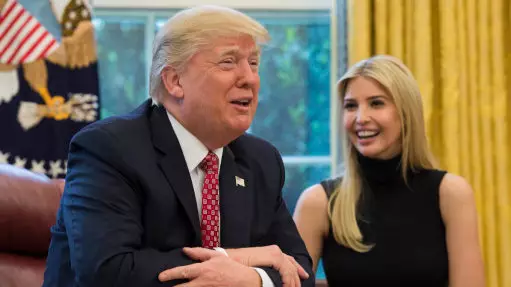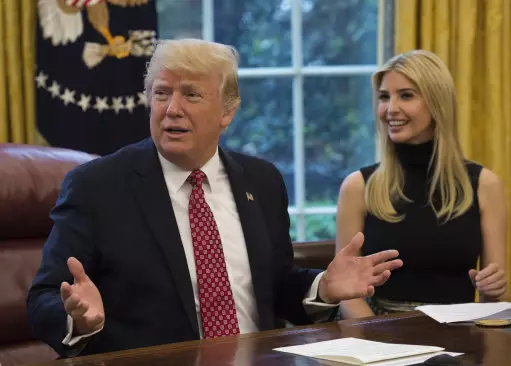
On 20 January 2017 Donald Trump was inaugurated as the 45th President of the United States, and perhaps the most controversial.
Any US President is judged on their first 100 days in charge; the time when they are perhaps at their most powerful and when their influence is greatest.
Saturday 29 April will be Trump's 100th day, but how has he been assessed? How is his government performing? Has he made the right decisions? How does he compare to his predecessors?
Credit: BBC
Advert
He's already tried a ban on Muslims, faced protests, met Prime Minister Theresa May and the Chinese President Xi Jinping, threatened to take the courts to court, seen controversial employment of staff, had various Twitter meltdowns, warred with the media ('fake news'), had his say on North Korea, and bombed Syria and Afghanistan. Wow.
But how is he viewed? Has he been a success, or a failure? And what can we expect in the next 100 weeks, let alone days? LADbible asked various political experts to have their say - reading behind the man in the White House.
Popularity
First, how did we get here. Why was, and still is, Donald J Trump still so popular among his supporters?
According to Patrizia Catellani, a professor of social psychology in Milan, Italy, Donald Trump appealed to the 'emotional' voters, those sick of the establishment. He was, it would appear, America's version of Brexit.
She told LADbible: "The voters wanted to express 'a vote against', as they have often done in recent times. Trump was the right answer. He was (apparently) anti-establishment, anti-media, anti-intellectual people, anti-political choices made up to that point by Obama."
She added that a 'gut vote' psychologically for Americans was one 'not based on in-depth reasoning, but certainly based on strong motivations'.
This was echoed by Nathan Kerrigan, a specialist in voting behaviour and public opinion, who said: "The psychology behind the vote was the rhetoric behind anti-globalisation. People are looking an alternative America, and that's what is driving support."
Advert
Credit: Fox
Trump tried to present himself as a working class hero - his opponents would argue otherwise - and the way he positions himself means that his support continues to grow.
"I would have thought, like farmers and Brexit in the UK, that the support [for Trump] would have died down, and people would have realised he's not like them, but it appears to grow," added Kerrigan.
"Much support for Trump comes from rural communities," he continued. "That's where the constructions of American nationalism are rooted."
Advert
Psychology Behind The President
OK, so his appeal continues to be strong among supporters, but is this a front? Some argue that although he can talk the talk, Donald Trump fails to walk the walk.
"Trump is a very weak leader, he talks the talk, but in terms of being a leader, and bringing folks together, he's poor at that," Scott Lucas, a professor of American Studies at the University of Birmingham told us. "In business feuds are fine, in the White House it's chaos."
Professor of Political Psychology at the University of Bournemouth, Barry Richards, said Trump's extreme narcissism tendencies are yet to fully unfold. He said that Trump looks for the 'admiration' of his people.
"In the case of Donald Trump, before he became President his needs were met by his brand, he was the centre of a celebrity empire," he said. "This sustained him for 50 years. We're 100 days [into] what's a new experience for him. It's not clear how his narcissistic needs will be met.
"He has the strategy of walking tall and acting tough on the international stage, clearly in Syria and South Korea; this would suggest this style has some meaning for him. It's continuous from his business days."
Advert
Presidential Policies
Now we know why he was elected and why his support continues to grow, and how he has portrayed himself and, again why. But how has he done in terms of his policies?
Firstly, it is perhaps important to remind ourselves of what Trump outlined...
Advert
Credit: The White House
Trump's pledges were numerous - 12 to be precise - and they included building a wall to stop immigration from America, reassessing trade, removing Obamacare and eliminating gun-free zones.
"Domestically, Donald Trump has still not had a single victory in terms of legislation," said Professor Lucas. "The effort to replace Obamacare got completely ripped up."
In terms of foreign policy, Professor Lucas told LADbible that Trump leads a very contradictory line, as he explained: "Does Trump still want to be best friends with Russia, or will he take a hard line with Putin? Will he criticise China, or will he work with them on North Korea? Is NATO obsolete or necessary to him? Where's the plan to defeat Islamic State as promised? What does he know about Syria beyond the air strikes? There has been no foreign policy yet to say where the Trump line is."
The Trump movement is one that, according to Lucas, is causing dangerous factions in America's most famous building.
"Anybody who watches House of Cards, or West Wing, will know the White House is not sweetness and light at any time, there's people trying to vie for favour. But this is the most divided White House ever."

Donald's appointments to office have left questions. Credit: PA
Professor Bob Shapiro, another voting behaviour and public opinion specialist, said: "He's overestimated how much he can do. He said these would be the greatest 100 days of any president, and he may have had reason to think this, but he overestimated."
Shapiro notes that Trump's successes came in getting his Supreme Court nominee through and in implementing the removal of some regulations - particularly environmental ones.
Patrizia Catellani said this could turn out to be a fine balance between being clean, in terms of pollution, and economic success. She said: "This way the USA will be able to pursue energy independence, improve the economy and create new job positions through coal extraction... but it's important to highlight the reality of purely hypothetical outcomes." Nobody knows whether this will be a genius move or not.
Trump On Social Media
If there's one thing Donald Trump can't do without it's Twitter, with many experts believing this is his release - although not all think allowing him access to Twitter, in such a position, is a wise idea.
Professor Lucas perhaps sums up Trump's social media usage superbly: "batshit crazy". It's something, he explains, has happened before as a 'tactic'.
"Nixon and Kissinger tried an approach of 'batshit crazy' so you couldn't predict what he was going to do. Almost saying to the Russians, 'don't push him too far, he may just test you'.
"Trump may actually be that crazy. It destroys any sense of planning in what you are trying to do for foreign policy. Trump on social media means you can't start at the same point of being rational and planning what they say. Trump talks, and thinks, gibberish.
"He just wanders off. It comes back to narcissism. But, others will flip this and say he is very clever."
But, is he learning? Professor Richards thinks so. He said: "It seems to me he's been less publicly aggressive, but then it's hard to know where that aggressive trait may lead."
The Future
That's 100 days down, but there's plenty more to come, or is there? There have been concerns as to whether Trump will last the full four-year term of his presidency.
"He won't go because of impeachment," said Professor Lucas. "He will go for health reasons. He's 70, he's put on a lot of weight since becoming President, and he runs on anger and frustration 24/7. That's not conducive to someone who, given the demands of the job, will not last the cause."

Credit: PA
Having said that, Lucas believes that Trump has a lot more to learn in terms of foreign policy: "In terms of Syria, on that basis, it doesn't change the main issue which is Russian and the Assad regime," he added.
"The 'mother of all bombs' in Afghanistan killed a few IS people, but it doesn't change the main issue of the Taliban - where is the bomb to solve that situation? With Trump, it's sideshow politics.
"EU countries are no longer thinking the US leads and we will follow. Trump isn't a cause, he's a symptom."
Also, Trump must recover from several defeats in the White House in his executive orders. A new tax reform bill is due to appear soon, and is likely to be approved, but there have still been crushing defeats for the President to learn from.
"It's still not clear how he'll respond," concludes Professor Richards. "As a businessman his response was explosive, he'd threaten competitors and take them to court. 100 days isn't a long time for someone to assume fully the role of President of the United States. It will take time for it to pan out."
Featured Image Credit: PATopics: President, Donald Trump, USA